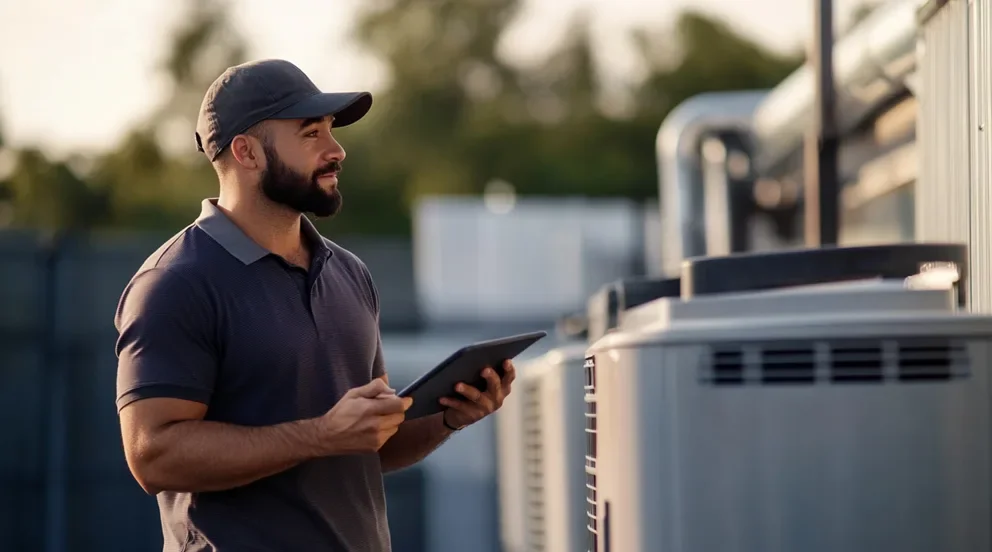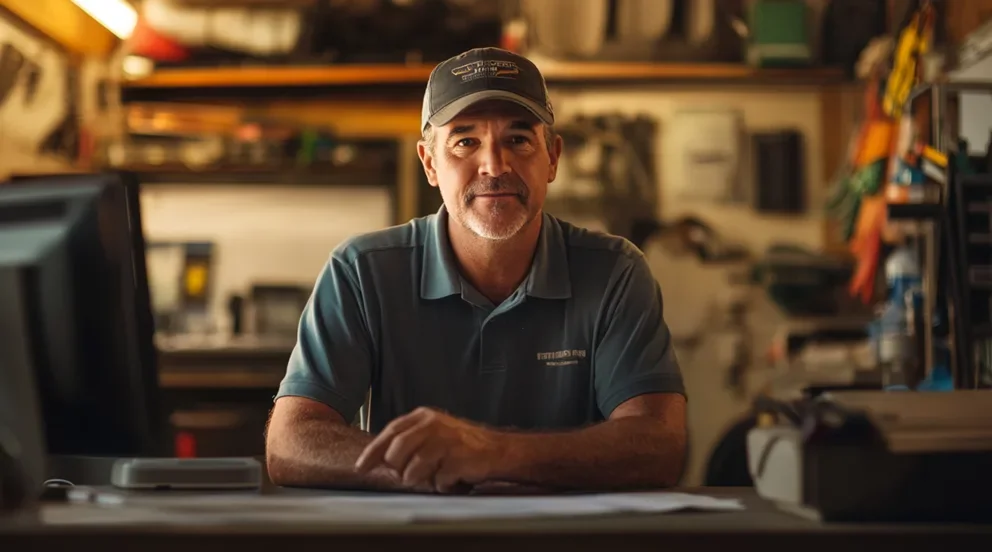In this part, we’ll explore HVAC training programs. These programs are crucial for those pursuing HVAC careers. They offer both classroom learning and hands-on practice.
Such programs prepare students for roles in installation, repair, and maintenance. Lessons typically mix lectures with actual tool usage. Moreover, internships often form part of the coursework, providing real-world insights.
The HVAC sector needs trained workers due to its growth and the increasing sophistication of systems. Hence, these programs are key. They ensure a pipeline of able professionals ready to tackle the challenges of modern HVAC systems.
Content:
- The Heating Up Trend: Importance of Modern Education for HVAC Careers
- HVAC Future: An Emphasis on Evolving and Adapting Education for Nullifying the Skills Gap
- Reigning the HVAC Marketplace: The Power of Modern Learning
- Seeing the ‘BIGGER’ picture: The Reliance of the HVAC Industry on Reformed Education
- Dismantling Antiquity: Advanced Education Style Transforming the HVAC Field
While some programs focus more on theory, others prioritize practical skills. The goal remains the same – to forge capable HVAC professionals. Thus, training programs vary, but the ultimate aim is a balance between knowledge and practice.
The Heating Up Trend: Importance of Modern Education for HVAC Careers
Modern education plays a crucial role in HVAC careers, as technology rapidly evolves. The growing complexity in heating, ventilation, and air conditioning systems demands a workforce skilled in the latest advancements. Training programs must now go beyond traditional methods, incorporating digital tools and software into their curriculum. This integration not only enhances the learning experience but ensures that students are well-equipped for the technical challenges they will face in the field, making modern education not just beneficial but indispensable for HVAC professionals.
The HVAC industry is constantly under innovation’s spell, and educational institutions must keep pace. They now focus on offering hands-on experience with cutting-edge equipment and simulations to mimic real-world scenarios. This exposure is vital for fostering adeptness in troubleshooting and system optimization. As older systems are phased out, new eco-friendly and smarter technologies take their place, making continuous learning imperative. Graduates must emerge from programs not just with knowledge, but with a future-proof skill set.
In order to address the specific needs of HVAC careers, modern programs incorporate soft skills training as well. Communication, problem-solving, and customer service are taught alongside technical skills. Given that HVAC professionals often interact directly with clients, these interpersonal abilities are just as important as technical expertise. Recognizing the shift towards green technologies, sustainability concepts are also woven into the coursework, preparing graduates to contribute to environmentally friendly practices in the industry.
Employers in the HVAC field are increasingly selective, recognizing the benefits of hiring staff with up-to-date education. They are on the lookout for individuals who can immediately contribute, reducing the need for extensive on-the-job training. With the rise of smart home and building technologies, education that includes IoT (Internet of Things) and automation is highly sought after. Institutions that adapt their programs to reflect these developments will position their students at the forefront of the candidate pool.
The importance of modern education for HVAC careers cannot be overstated. The sector’s employment opportunities are expected to expand, but only those with current knowledge and skills will fill these roles. Educational institutions must not simply adjust – they must innovate, acting as the engines that drive HVAC expertise forward. As the industry standards heighten, the role of such education becomes not just an enhancement but a necessity, ensuring that the future of HVAC is as robust and efficient as the systems it seeks to master.
HVAC Future: An Emphasis on Evolving and Adapting Education for Nullifying the Skills Gap
The HVAC industry confronts a skills gap exacerbated by rapidly advancing technologies and an aging workforce. This gap presents a daunting challenge for the industry, but simultaneously offers an opportunity for educational reform. As such, the focus on evolving educational strategies is quintessential. Modernized training can bridge this gap by equipping new technicians with knowledge and competencies that are relevant to the current demands of the job market, consequently bolstering the industry’s longevity.
Education in HVAC is shifting away from rote learning and moving towards a curriculum that emphasizes critical thinking and adaptability. Students are encouraged to understand underlying principles rather than just memorizing procedures, fostering a mindset that can adapt to various situations. Updated vocational programs now integrate real-time diagnostic software and advanced troubleshooting, skills that are indispensable for modern HVAC systems. This dynamic approach prepares students to not just perform tasks, but also to innovate solutions.
Understanding the importance of sustainability is becoming a core element of HVAC education. With climate change concerns mounting, the industry is directing efforts towards products and services that minimize environmental impact. Future technicians must comprehend green technologies, energy efficiency, and the implementation of renewable sources in HVAC systems. Educational institutions are thus impelled to craft curriculum that not only informs but also instills a commitment to these sustainable practices.
To counter the skills gap, partnerships between industry and education are integral. Such collaborations can provide students with apprenticeships and experiential learning, directly aligning education with the real-world demands of the HVAC sector. These partnerships help in updating training modules with the latest industry standards and practices, creating a workforce ready for immediate deployment. The integration of industry input ensures that training programs are not just current but also forward-looking, anticipating future challenges and changes.
In conclusion, adapting education for HVAC must be a priority to nullify the skills gap. Through modernized curriculum, integration of sustainability, and industry-education partnerships, we can prepare a workforce able to address current challenges while anticipating future trends. Education must not lag behind but lead, refining the skills of the next generation of HVAC professionals and, in turn, ensuring the industry’s relevance, efficiency, and growth in an ever-changing landscape.
Reigning the HVAC Marketplace: The Power of Modern Learning
To reign in the competitive HVAC marketplace, professionals must possess an unparalleled level of expertise. This is where the power of modern learning shines, as it encompasses not merely the technical knowledge but also instills agility and innovation. Educational institutions play a pivotal role, as they must constantly update their offerings to reflect the latest industry developments, thereby creating graduates who are more than prepared; they are pioneers.
Modern learning in HVAC is characterized by the use of digital tools and simulation-based training. The classroom experience is enhanced with virtual reality (VR) and augmented reality (AR), which allow for immersive learning environments. These technologies provide a safe space for students to master complex skills before encountering them in the field, thereby reducing errors and increasing efficiency. Including these state-of-the-art methods into training programs is no longer futuristic—it’s a necessity for staying relevant in the HVAC field.
Another hallmark of modern learning is its focus on modular and flexible education. Instead of monolithic course structures, training is becoming more fragmented, allowing professionals to update specific skills or acquire new ones without having to undergo a full program. This approach caters to the reality of the HVAC industry, where continuous professional development is not optional but critical. Lifelong learning becomes not just a concept but an integral part of a thriving HVAC career.
Collaboration and networking are also embedded into modern HVAC learning. Institutions foster connections between students, experts, and industry leaders through events, workshops, and forums. These interactions create opportunities for mentorship and the exchange of ideas, which can lead to innovations that propel the industry forward. Modern learning isn’t just about individual advancement; it’s about nurturing an ecosystem that uplifts the entire HVAC marketplace.
In conclusion, the power of modern learning in preparing individuals to excel in the HVAC industry can’t be overstated. The successful integration of the latest learning technologies, flexible education models, and an environment conducive to networking and collaboration will create a new breed of professionals. These well-equipped individuals will not just navigate the HVAC marketplace—they will lead it.
Seeing the ‘BIGGER’ picture: The Reliance of the HVAC Industry on Reformed Education
The HVAC industry, in its stride towards excellence, must see the ‘BIGGER’ picture, and at its core lies reformed education. The industry depends heavily on academia to sculpt a workforce that is technically proficient and visionary. Students must be taught to not only install and repair but also to understand the full scope of HVAC systems, including their impact on energy consumption and the environment. It’s this broader perspective that is pivotal for the industry’s progression.
A reformed education within the HVAC sector delves into advanced technologies such as building information modeling (BIM) and predictive maintenance. These concepts are essential for the creation of efficient and smart HVAC systems. The emphasis is on creating a curriculum that mirrors the complexity and interconnectedness of current systems, integrating them with other building services. By doing so, we prepare technicians for a future where the synergy between different building systems is paramount.
The reliance on reformed education is further highlighted by the need for improved customer service and project management skills. HVAC experts must be adept communicators, capable of managing projects, and responding to customer needs with empathy and expertise. It’s not just about technical know-how; it’s about being a complete professional who can lead projects and provide end-to-end solutions, something that reformed education aims to instill from the get-go.
Sustainability practices and energy efficiency are no longer extras but fundamentals in HVAC education. Programs now incorporate lessons on the environmental impact of HVAC systems and the role they play in creating sustainable buildings. Teaching students to optimize systems for energy conservation is a key aspect of reformed education, aligning the industry’s efforts with global sustainability goals.
In summary, seeing the bigger picture means understanding the reliance of the HVAC industry on reformed education. It involves training that is comprehensive, futuristic, and environmentally conscious. By emphasizing advanced technology, soft skills, project management, and sustainability, reformed education doesn’t just prepare individuals for a job; it prepares them for leadership in an industry that is essential to our daily living and the well-being of our planet.
Dismantling Antiquity: Advanced Education Style Transforming the HVAC Field
In the quest to dismantle antiquated practices, the HVAC field turns to advanced education styles to transform the industry. Traditional approaches no longer suffice in preparing students for the complexities of modern HVAC systems. Interactive learning experiences, integration of contemporary technologies, and a strong emphasis on energy efficiency are at the forefront of this educational revolution. With these changes, the HVAC field is witnessing a transformation that is not just necessary but revolutionary.
To remain at the cutting edge, HVAC education has embraced online learning platforms. These provide students with the flexibility to learn at their own pace and access resources beyond geographical constraints. Virtual classrooms and e-learning libraries allow for continuous professional development, a critical element in an industry where outdated skills can render a professional obsolete. Investing in digital learning infrastructure has thus become a priority for institutions aiming to lead in HVAC training.
The sophisticated equipment used in today’s HVAC systems demands equally sophisticated training techniques. Advanced education exposes students to modern diagnostic tools and automation systems that are becoming industry standard. Initiatives that encourage experimentation and practical problem-solving help students understand the intricacies of such systems in-depth. This hands-on approach equips them with much-needed competencies to navigate the evolving landscape of HVAC technology.
Collaborative projects and industry participation play a key role in advanced education for HVAC. By involving industry partners in curriculum development and execution, students get a taste of real-world challenges and expectations. Such collaborations ensure that the education provided is not just current but also aligned with the future skill requirements of the industry. This symbiotic relationship between education and industry is central to transforming HVAC practices.
Conclusively, advanced education styles are pivotal in transforming the HVAC field. By building a modern learning environment that promotes technological fluency, practical expertise, and industry-relevant skills, these educational reforms are dismantling traditional limitations. The result is a robust pool of HVAC professionals ready to not just work within but to elevate the industry, ensuring that it continues to thrive in an era of rapid technological and environmental change.



